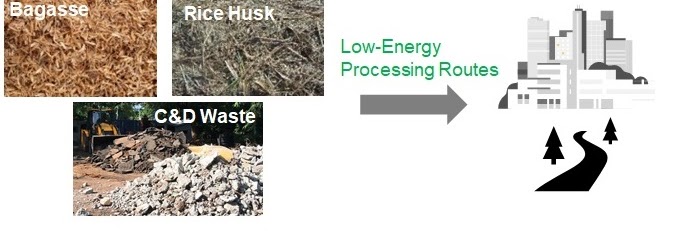Fundamental research from molecular scale to macroscopic scale
Fundamental research is key to building technologies for the future. In this CoE, a principal component of our research is aimed at gaining fundamental scientific knowledge on construction materials from the molecular level to the real-world structures that enable us to make technologies for low carbon and lean construction.
A primary ingredient to this is the utilization of waste as a resource for the construction industry.
We will be looking at the physico-chemical processing of waste for high-volume use in construction materials. This includes studying the mechanical and durability characteristics of concrete made using such processed wastes in various environmental conditions. Usage of waste and other resources to make low carbon concrete systems is also being explored here.
Apart from agricultural wastes, a suitable source of material for utilization in sustainable construction industry is the construction and demolition (C&D) wastes. In order to process C&D waste, we need to sort and segregate the different components that may have gone into the construction of the buildings. We develop sensor technology for automatic sorting and segregation of C&D waste that will allow us to accelerate procurement of useful material for processing.
Sustainability is being portrayed in different ways in modern world to capture the goodness in certain products or development. As scientists we rely on sustainability indicators using life-cycle analysis (LCA) methods. Here, we develop tailored LCA framework to assess the environmental effects of using these processed waste materials as construction materials.
Chemical admixtures are an essential component of concrete these days. With it being termed as ‘spices’ of concrete, its use is more relevant and challenging in low CO2 concrete. Here, we aim to understand the basic mechanisms of organic admixtures on cement hydration using a combination of experimental and molecular simulations.

